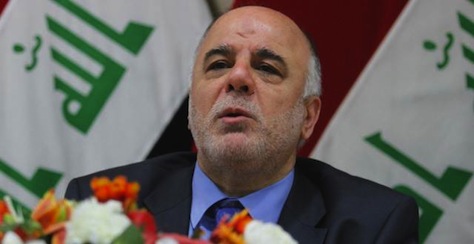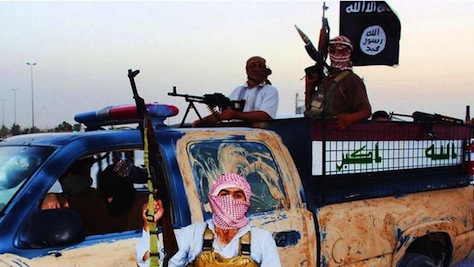
It’s been barely over two years since all US military personnel left Iraq in December 2011, but you could be forgiven if you think that it feels much, much longer. 
When Iraqis go to the polls to vote today, it won’t likely make front-page headlines in the United States, even as Iraq moves away from national unity and toward growing sectarianism once again.
The last time that Iraqis went to the polls, the country seemed like it was on the mend. The destructive civil war from 2006 to 2008 that divided Baghdad (and much of the rest of Iraq) on Shiite and Sunni lines had subsided, thanks in part to a ‘surge’ of US military force and the ‘Awakening,’ a movement Sunni Iraqi leaders to combat radical elements like al-Qaeda. Iraq’s prime minister since 2006, Nouri al-Maliki, was running for reelection on a nationalist platform just as much as he was running to emerge as the leading Shiite power broker.
Fast forward four years, and Iraqis now seem less sanguine about the future than at any time since 2008. Even though Maliki (pictured above) is favored to win a third term as Iraq’s prime minister, Iraq’s future is an uncertain as ever. Exacerbated by the three-year civil war in neighboring Syria, sectarian tensions are once again on the rise. Corruption and mismanagement among Iraq’s ruling class has corroded the ability of its government to deliver even the most basic of public services, to maximize oil revenues or to provide sufficient power in Baghdad or elsewhere in the country. Members, both Sunni and Shiite, of Maliki’s ‘national unity’ government have spent the past four years fighting over access to power rather than working on policy solutions. In reality, the ‘national unity’ government, as headed by Maliki, has contributed to Iraq’s growing disunity. What’s more, it’s brought a disturbing lack of accountability — because everyone’s inside the government, there’s no opposition to hold the government accountable and there’s no credible alternative-in-waiting.
Dissatisfaction is growing at an alarming rate among Iraq’s Sunni Arab minority — note that Sunni Arabs roughly constitute around 20% of Iraq’s population, with Shiite Arabs comprising around 60% and Iraqi Kurds comprising 20%.

That’s left much of the western al-Anbar province under the control of more radical Sunni groups that are also fighting against Syrian president Bashar al-Assad in Syria. Clumsy attempts last December by the Maliki government to assert control over Fallujah and other cities in the Sunni-dominated west only served to empower Sunni resistance, including a fair share of radical jihadists, such as the Islamic State of Iraq and the Levant (ISIS or ISIL, الدولة الاسلامية في العراق والشام, ad-Dawla al-Islamiyya fi al-’Iraq wa-sh-Sham), which formerly held itself out as Iraq’s homegrown branch of al-Qaeda, and which is active in Syria as well. But the violence is no longer confined to the west — an alarming number of suicide bombings and other attacks are on the rise all across Iraq, from Baghdad to Basra, the oil-rich province in the far south.
* * * * *
RELATED: What is happening in Iraq, Fallujah and al-Anbar province?
* * * * *
Radical groups have warned Sunni Arabs against participating in today’s elections on threat of violence. But parts of the Sunni west are so dangerous that the central Iraqi government won’t even be able to conduct elections there. The unrest follows Maliki’s systematic exclusion of top Sunni figures from government, including Iraq’s vice president, Tariq al-Hashemi, who fled to Iraqi Kurdistan and then Turkey after Maliki’s forces tried him for murder and sentenced him to death. From the army to the central bank to the oil ministry, Maliki has skillfully excluded his ostensible Sunni partners in favor of Shiite allies.
Meanwhile, in the north, Iraqi Kurdistan has forged ahead with an increasingly autonomous government that’s avoided many of the missteps of the central government, even as Iraqi Kurdistan pulls further away from Baghdad. For example, the Kurdish government is now shipping 100,000 barrels of oil a day through a pipeline to Turkey, thereby exacerbating relations with Baghdad to the point that Maliki has suspended the 17% of the Iraqi budget allocated to the Kurds. As Iraqi Kurdistan continues to prosper as an oasis of stability with a relatively successful democracy and a strong economy that is attracting a growing amount of foreign investment, it’s sharing less and less in common with the rest of Iraq that seems to be heading into turmoil.
* * * * *
RELATED: Bordered by chaos, Iraqi Kurdistan holds elections in relative oasis of peace and democracy
* * * * *
So amid all the gloom, what should you expect from the voting in today’s parliamentary election? Continue reading Competing Shiite groups to determine Iraq’s next government →
![]()



